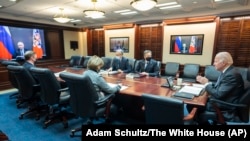The talks between U.S. President Joe Biden and his Russian counterpart Vladimir Putin dominated the Russian news cycle this week and hit No. 1 among Russian media topics on December 7, the day of their video summit. The discussions in part were driven by a massive Russian troop buildup on its borders with Ukraine, where Russia has fueled a separatist war.
That day, Russia’s most popular newspaper, Komsomolskaya Pravda, reported that the United States had admitted it would be unable to respond if Russia invaded Ukraine.
In an article headlined “U.S. Under Secretary of State: ‘If Russia attacks Ukraine, we won’t be able to help,’ ” Komsomolskaya Pravda claimed to quote Victoria Nuland, a top U.S. State Department official.
That quote is fabricated.
Komsomolskaya Pravda cited CNN as the source. However, it provided a hyperlink that led to the CNN website’s main news page, not to a particular news item or interview.
None of CNN’s reports referring to Nuland on December 7 included the quote Komsomolskaya Pravda attributed to her. The network reported that Nuland had briefed the U.S. Senate the previous night (Dec. 6) about the administration’s planning in case Russia does invade Ukraine.
“Nuland outlined the tough sanctions package being prepared by the administration in response to a potential Russian attack but acknowledged that the US' options to deter an invasion are fairly limited, a person familiar with the briefing said,” the CNN report read.
The phrase “[t]he US' options to deter an invasion are fairly limited,” comes closest to what Komsomolskaya Pravda reported, but it’s a far cry from ‘we won’t be able to help.’ And it’s anonymously sourced.
In an interview with CNN’s Jake Tapper on December 7, Nuland said Russia will face “extreme consequences if they move against Ukraine aggressively again.” This basically summarizes what Biden told Putin, according to the U.S. readout of their lengthy video call.
Nuland told Tapper the United States is consulting “intensively” with allies and partners about “a kind of response that would come immediately in a very painful way should Putin move.”
The State Department dismissed Komsomolskaya Pravda’s story as “propaganda and disinformation” in a statement to VOA. “It's not backed up by facts when you actually read down the article itself.”
Following the Biden-Putin talks, Russia’s Foreign Ministry handed a note of protest to the U.S. Embassy in Moscow over alleged actions by the United States and its NATO allies in the Black Sea, warning that their “reckless” behavior would have “dangerous consequences.”
Speaking from his residence in Sochi, on the Black Sea, on December 8, Putin raised the prospect of Ukraine joining NATO, the defense pact allying the U.S., U.K., Canada, much of Europe and Turkey.
“Russia conducts peace-loving foreign policy, but we have a right to provide for our own safety,” Putin said. “It would be criminal inaction on our side to spinelessly watch all that's taking place” were Ukraine to join NATO.
Putin’s statement synced with a barrage of patriotic messaging that Russian TV, news agencies and social media have been directing at domestic audiences over the last few weeks.
State-controlled media posted report after report referring to “tough but noble Putin/Russia,” “weak but evil Biden/U.S./NATO,” “corrupt and brainwashed Ukraine” facing “imminent occupation by NATO” and urgently in need of help from “Russia the savior.”
Margarita Simonyan, chief editor of Russia’s foreign broadcasting entities, including RT (formerly Russia Today) and Sputnik, proclaimed on national television that every war Russia has fought was “necessarily heroic and righteous.”
She added that the only war the United States has fought that could fit that description “with much stretching” was the Civil War.
In fact, Russia has been occupying Moldova's Transnistria region since 1992, and, under the leadership of President Putin, the Kremlin waged a war with Georgia in 2008. In 2014, Russia annexed the Crimean Peninsula and invaded eastern Ukraine. Russian military and state-backed mercenaries have been accused of war crimes committed in conflicts around the world, from Syria to Africa and beyond.
Russia's military aggression has been routinely backed by disinformation campaigns that Polygraph.info has been monitoring and debunking over the years, as have other fact-checkers.
No precise count exists of casualties of these wars and conflicts. In Ukraine alone, the death toll had reached 13,000 by 2019, according to a United Nations estimate.
Russia has been beefing up its military presence on several sides of the Ukrainian borders, including in Belarus and Transnistria. The United States and European Union estimate that Russia has deployed up to 175,000 personnel along its borders with Ukraine.
President Biden said he warned Putin that the United States is prepared to respond with severe economic restrictions if Russia attacks Ukraine again.
"I made it very clear, if in fact he invades Ukraine, there will be severe consequences, severe consequences — economic consequences like none he's ever seen or ever have been seen," Biden told reporters at the White House on December 8.
U.S. National Security Adviser Jake Sullivan said on December 7: “The United States is going to take every action that we can take from the point of view of both deterrence and diplomacy, to try to avert the invasion and deter the invasion into Ukraine. That is the object of our policy right now.”
